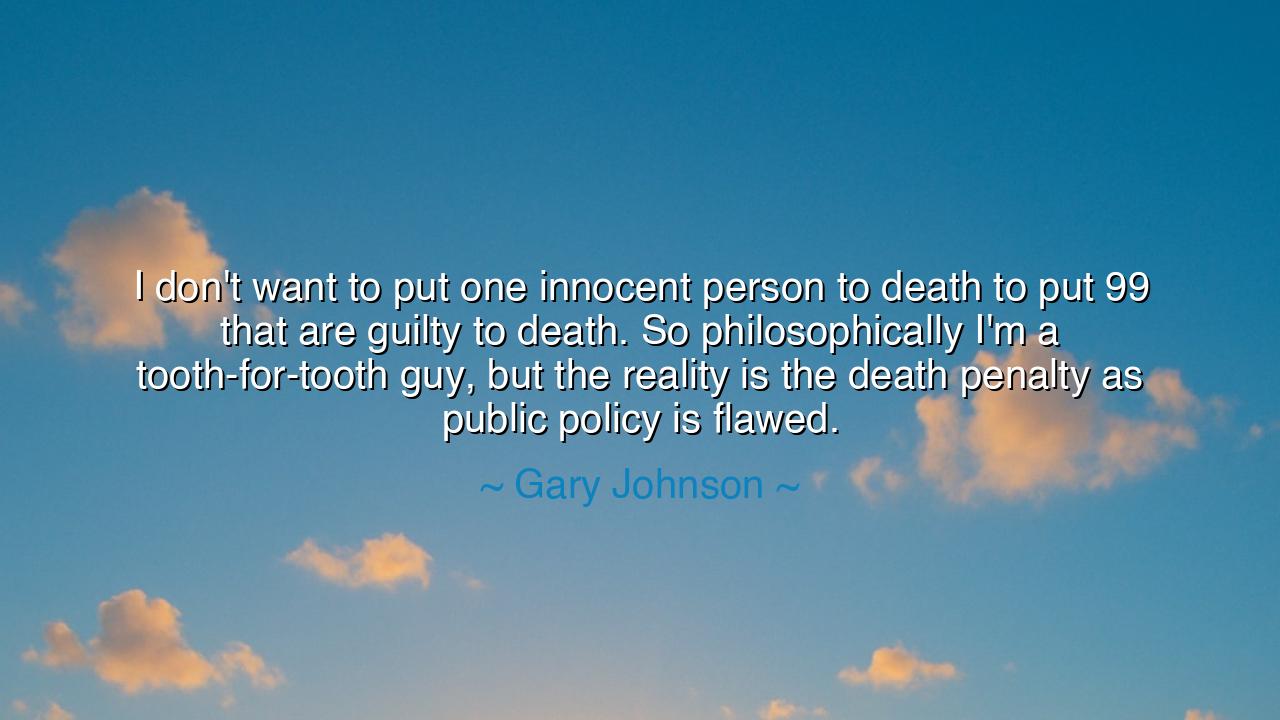
I don't want to put one innocent person to death to put 99 that
I don't want to put one innocent person to death to put 99 that are guilty to death. So philosophically I'm a tooth-for-tooth guy, but the reality is the death penalty as public policy is flawed.






“I don’t want to put one innocent person to death to put ninety-nine that are guilty to death. So philosophically I’m a tooth-for-tooth guy, but the reality is the death penalty as public policy is flawed.” — thus spoke Gary Johnson, a man who wrestled not only with the politics of justice but with the trembling weight of morality itself. In his words, there burns the ancient struggle between the heart that seeks justice and the conscience that fears injustice. For he admits that in theory, retribution feels righteous — that “a tooth for a tooth”, the balance of suffering, seems fair — and yet he sees the shadow that lies within: that even one wrongful death shatters the very foundation of justice itself.
From the dawn of civilization, humanity has been torn between these two fires — the instinct for vengeance and the calling for mercy. The Code of Hammurabi carved the law of retribution in stone: “An eye for an eye, a tooth for a tooth.” Yet in those same stones lay a warning, for to build a world on revenge alone is to make every man blind. Johnson, like the philosophers of old, saw that justice without humility becomes tyranny, and that punishment without truth becomes sin. What he speaks of is not leniency, but wisdom — the wisdom that sees the frailty of human judgment and trembles before its consequences.
Consider the story of Socrates, condemned to death by his own city for the crime of corrupting youth — though his only weapon was thought, and his only guilt was truth. His execution was lawful, his death permitted by public policy, and yet all of Athens bore the stain of his blood. So too through history have countless innocents perished beneath the cloak of law, their deaths deemed necessary to preserve order. But law without mercy, and justice without truth, are like swords wielded by blind men — they may strike the guilty, but they also strike the just.
Gary Johnson’s words rise from this ancient sorrow — the realization that human hands are too imperfect to wield the power of life and death without error. In every system, no matter how noble, there lies the seed of mistake; and where the cost is a single innocent life, the price is too high. The philosopher may yearn for balance, for the symmetry of wrong and retribution, but the leader must look deeper — must see that a justice that kills the innocent destroys itself. A thousand righteous verdicts cannot redeem one wrongful death, for truth does not weigh life in numbers.
In this conflict between principle and practice, Johnson shows the humility that marks true wisdom. He does not deny that evil must be met with consequence; he merely recognizes that justice must bow before truth. He reminds us that the measure of a society is not how it punishes its guilty, but how it protects its innocent. To err in mercy may be weakness, but to err in judgment is destruction. Thus, he stands between two worlds — the philosopher who believes in moral order, and the realist who knows that men, being flawed, cannot play the gods they imagine themselves to be.
Let us learn from his struggle, for it is the same that stirs in every human heart. We crave righteousness, yet we fear cruelty. We demand safety, yet we dread injustice. The true path of wisdom lies not in denying this tension, but in walking humbly within it, remembering always that the power to judge is sacred, and must be handled with trembling care. When the state takes life, it acts as if it holds divine authority — yet no mortal hand is pure enough for that burden.
Lesson: Seek justice, but temper it with compassion. Demand truth, but question certainty. Before calling for vengeance, ask whether your hand, or your law, could bear the weight of an innocent’s blood. A civilization’s greatness is not in its punishments, but in its restraint — in its ability to say, “I could destroy, but I will not, until I am sure.” For when justice bows before humility, and power before mercy, then — and only then — shall a society be worthy of the lives it governs.






AAdministratorAdministrator
Welcome, honored guests. Please leave a comment, we will respond soon